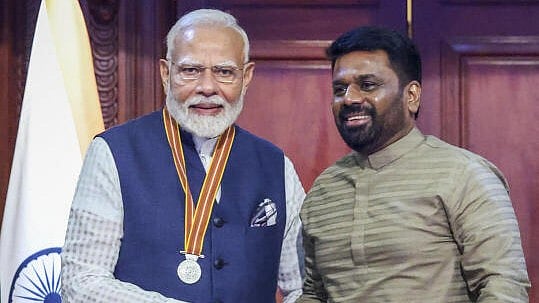
Prime Minister Narendra Modi (L) being conferred with the 'Mithra Vibhushana' award by Sri Lankan President Anura Kumara Dissanayake during a ceremony at the presidential secretariat, in Colombo, Sri Lanka.
Credit: @narendramodi on X via PTI Photo
New Delhi: The security of India and Sri Lanka is interconnected, Prime Minister Narendra Modi said as the two nations on Saturday inked a defence cooperation agreement amid China’s persistent bids to gain a strategic edge in the Indian Ocean region.
With Modi on a visit to Colombo from Friday to Sunday, India entered into a trilateral agreement with Sri Lanka and the United Arab Emirates for developing Trincomalee on the northeastern coast of the island nation as an energy hub. The agreement will pave the way for India and the UAE to jointly develop the unused oil storage tanks built by the UK in Trincomalee during World War II. It will also create a framework for the construction of an oil and gas pipeline between Sri Lanka and India.
“We believe that we have shared security interests. The security of both countries is interconnected and dependent on each other,” Modi said as he and Sri Lankan President Anura Kumara Dissanayake jointly addressed media personnel after a meeting in Colombo. “We welcome the important agreements made in the area of defence cooperation.”
Foreign Secretary Vikram Misri later told journalists that the agreement would provide further impetus to the existing defence partnership.
A source, however, told DH that the agreement would also create a framework for India to provide Sri Lanka with military hardware to augment the island nation’s defence capabilities.
Modi also thanked Dissanayake after the Sri Lankan president reiterated his December 2024 assurance that the Indian Ocean nation would not allow its territory to be used in any manner against the security interests of India.
New Delhi inked the defence partnership agreement about three months after Colombo quietly lifted a one-year moratorium imposed in January 2024 on operations of foreign research vessels in Sri Lankan waters and port calls by them. The moratorium had been imposed to allay New Delhi’s concerns over the frequent forays by the Chinese PLA Navy’s spy ships in the Indian Ocean region, particularly in Sri Lankan waters. Dissanayake’s meeting with Chinese President Xi Jinping in Beijing in January also saw the two sides agreeing to sign an MoU soon on “ocean cooperation.”
Modi and Dissanayake virtually inaugurated several projects funded by India in Sri Lanka, including 5,000 solar rooftop units installed at religious places across the island nation and a temperature-controlled warehousing facility at Dambulla in the central province of the country. They also virtually joined the ceremony marking the launch of the construction of the 120 MW solar power project in Sampur, nearly 30 km southeast of Trincomalee.
“The Sampur Solar Power Plant will help Sri Lanka achieve energy security. The agreement reached to build a multi-product pipeline and to develop Trincomalee as an energy hub will benefit all Sri Lankans,” Modi said, adding that the agreement for grid interconnection between the two countries would create opportunities for Sri Lanka to export electricity.
Dissanayake thanked Modi for India’s support in the wake of the 2022 economic crisis in Sri Lanka. “In the last six months alone, we have converted loans worth more than $100 million into grants. Our bilateral debt restructuring agreement will provide immediate assistance and relief to the people of Sri Lanka,” Modi said after the meeting with Dissanayake.
“Today, we have also decided to reduce interest rates (for the loans India granted to Sri Lanka). It symbolises that India stands with the people of Sri Lanka even today,” the prime minister said, underlining New Delhi’s continued support to the neighbouring Indian Ocean nation.
